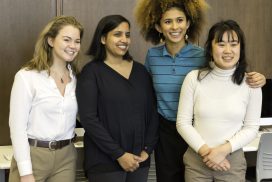ACCESS Scholars Testimonials
ACCESS Class of 2018
The ACCESS program opened my eyes to the interconnected nature of all aspects of STEM and some humanities. This encouraged me to broaden my understanding of STEM concepts by taking a multidisciplinary view and by examining the same topic from many different perspectives. Aside from opening my eyes in an academic setting, ACCESS also connected me with a network of intelligent women in STEM who I am fortunate to have met.
The opportunity to meet strong-minded and dedicated women in STEM disciplines was so empowering. Amazing friendships were gained, class was intriguing every day, and the opportunity to explore various STEM majors was invaluable.
One of the most rewarding [elements of ACCESS] was engaging with a community of other young women, both inside and out of the classroom. I found that I could engage in enthusiastic discussions about classroom projects with my peers. I think that our mutual excitement, when it comes to science-related topics, really brought us together as a community and created a supporting group of friends who also understand some of the unforeseen challenges that come with studying science as a woman. I really enjoyed having the opportunity to talk to women who are members of the science or engineering faculty… hearing from them in class on the diversity of topics they study and getting advice from them one on one really strengthened my interest in many STEM disciplines. Ultimately, this exposure led me to realize I wanted to change my major to one I hadn't even considered going into ACCESS.
I really enjoyed getting a head start on my education at the U. It gave me time to adjust to becoming a college student and understand what it means to be totally in charge of my own education. It really helped me look at what I would like to do in the future and I made so many new life-long friends.



ACCESS Class of 2017
As a first-generation student, the [ACCESS] summer program helped me integrate more easily into college life and provided me with an incredible support system.
My research experience helped me to appreciate how science is used in the real-world, and helped me to step out of my comfort zone and explore areas I never would have thought of.
ACCESS Class of 2011
For my ACCESS research experience, I worked in an astronomy lab which mostly meant teaching myself how to program. After spending the better part of a month fixing a bug in my code, I thought there must be a better way! I started taking computer science classes, and I've been looking for better ways to write code ever since. I'm now pursuing a PhD in computer science and love it. I'm not sure I would have found my way here if I hadn't started working in that astronomy lab as a freshman, so thank you ACCESS!



ACCESS Class of 2010
Without ACCESS I probably would never have entered and remained in the field of engineering! At times it was difficult to attend classes with so few women or work in a male dominated field. ACCESS showed me that there were many other like-minded, strong, and intelligent women who were also passionate about science and engineering, and that I was not alone in my pursuits!
There are many opportunities that have had tremendous impact on my life… but the ACCESS Program was and is one of the most influential. The program, which introduced different perspectives and sides of the sciences in a very hands-on way, has helped inquisitive minds develop skills essential for success in STEM. I gained lifelong friendships with my fellow classmates and an even greater support network. I've never felt isolated being a woman in STEM. I've learned to find value in myself as a scientist and in others.
ACCESS Class of 2008
My research focuses on developing and utilizing biophysical analyses to establish the complex molecular pathways in immune and epithelial cell biology (PhD candidate, Rice University). ACCESS was the perfect foundation I needed to succeed as a woman in STEM.



ACCESS Class of 2006
I'm so grateful to ACCESS for the start it gave me. I never thought I would become a geologist. I started out as a physics major and quickly realized it wasn't for me. My academic success all started with ACCESS and especially with exposure to research during my first-year of college, without which I would not have gotten a position in an environmental engineering lab. This introduction changed my academic goals and set me on path for my future career. I graduated from the University of Utah with degrees in Geology and Geological Engineering and went on to become an NSF Fellow at the Ohio State University, where I graduated with a Master's degree in Geochemistry.
I graduated with Mathematics and Biology degrees from the U, earned a PhD in biology at the University of Washington, and started working in science policy. I have worked as an Associate Program Officer at the National Academies of Sciences, and currently am a AAAS Fellow, in a congressional office. It all started in ACCESS, a program that changed the course of my education and life.
ACCESS Class of 2002
I'm very grateful to the ACCESS program. I think the biggest thing I learned is that women are often doing much better than they think. During the ACCESS physics module, the instructor told us how females will get Bs, and think they are failing and drop out of the sciences. While males, in the same courses, will get Cs and think they are doing awesome!
ACCESS Class of 1997
I want to applaud the existence of programs like ACCESS and the strong individuals who put tremendous effort and patience into their coordination. If equal representation and continued innovation are of true concerns, these programs and their coordinators demand the utmost respect and investment.